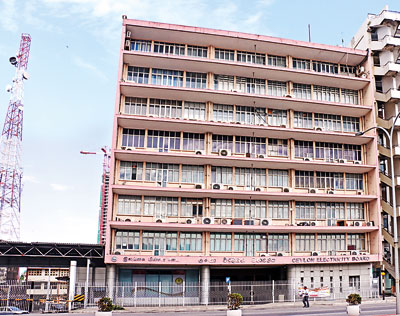News
Consumers paying more for CEB’s mismanagement and irregularities

COPE chairman Sunil Handunetti and other members of COPE addressing the media on Wednesday. Pic by Indika Handuwala
The parliamentary Committee on Public Enterprises (COPE) which examined the accounts of the Ceylon Electricity Board (CEB) found that consumers are paying more for electricity due to years of poor financial management of the Board and also raised serious questions about the composition of the Boards of Directors of the CEB’s subsidiary companies.
The Committee in its report submitted to Parliament on Tuesday noted that while the actual cost of a unit of electricity was four rupees, a higher price had to be fixed for a unit because CEB funds had been used to settle massive loans obtained for development projects. At preset consumers pay between Rs. 7.85 and Rs 45 a unit, depending on their monthly usage.
In the first ten months last year, the CEB had obtained loans to the tune of Rs. 318 million. The CEB’s total unsettled bank loans stood at Rs. 44,381 million by October last year, the report said.
Another disturbing revelation by COPE which undertook a study of 20 subsidiary companies operating under the CEB was that the same officials were serving on the Boards of Directors of several of these companies with one official serving in as many of 15 of them and another in 13.
The COPE said the CEB Chairman was himself on the Boards of six subsidiary companies and this enabled him to take different positions in regard to the same issue thus “jeopardising the main aim of the Board which is to provide electricity to the consumers at an affordable price.”
The Committee observed that the CEB had no control over these companies and that the meetings of these boards were not attended by an official of the Ministry or the Treasury.

CEB under a cloud
The Committee made particular reference to L.T.L. Holdings Private Limited; a CEB subsidiary established in 1982 with the aim of manufacturing transformers for CEB’s electricity distribution systems.
The CEB holds 63 percent of the shares of this company with L.T.L. Holdings having 27 per cent of the shares and a trust representing employees. There are 15 sub subsidiary companies coming under L.T.L.Holdings.
When COPE summoned L.T.L. Holdings officials to appear before it, there had been grave reluctance on the part of L.T.L.Holdings and its subsidiary companies to appear.
They had refused to comply with the COPE directive insisting that L.T.L.Holdinga and its subsidiary companies were independent. However COPE had emphasised that it was compulsory for all institutions coming under the category of public enterprise to appear before it and the Public Accounts Committee, irrespective of the fact that their accounts are audited by the Auditor General or not and that COPE should have the power to monitor the activities of companies that handle money for the Government.
The Committee observed that the CEB was unaware of the meetings of L.T.L. Holdings and the CEB and the Treasury were informed only of matters of significant importance.
The COPE report warned that CEB dividends might dwindle as L.T.L.Holdings and its subsidiary companies had consumed a major portion of dividends. The Auditor General’s Department had examined whether the shareholders of the CEB had recovered dividends in an equitable manner and found that while the CEB should have received Rs. 7,184 million as dividends, but had received only Rs. 6,952 million.
The COPE recommended that a methodology be made in consultation with the Auditor General for these institutions to be responsible to Parliament with regards to their activities and that arrangements be made to appoint a representative of the CEB to institutions such as L.T.L.Holdings.
| COPE asks Govt. for report on Indo-Lanka use of Trinco oil terminal The Committee on Public Enterprises (COPE) has asked the Government to submit a report inclusive of the proposed joint programme between India and Sri Lanka, in connection with the use of the oil storage terminal in Trincomalee. COPE has also asked for a copy of the feasibility report related to the development programmes on the storage complex be submitted to it prior to its approval. The Committee has asked for these details from the Ceylon Petroleum Corporation (CPC), after its officials told the Committee it is due to implement a joint programme with India, in connection with the development programmes for Trincomalee. There are 100 oil tanks in Tricomalee, each of 100 metric tonne capacity, of which one is damaged, while 14 of the tanks are used by LIOC. Cabinet approval was obtained recently to take over 16 tanks for oil storage. In a report submitted to Parliament, COPE also referred to the hedging agreement and said, while the total loss to the country due to the hedging deal, stands at Rs 10.2 billion, it will reach Rs,15 billion, once all the due payments are made. Of this amount, the Government has paid more than Rs 404 million as legal fees to foreign lawyers who appeared in the arbitration process started by the Deutsche Bank against the Sri Lanka government. |

